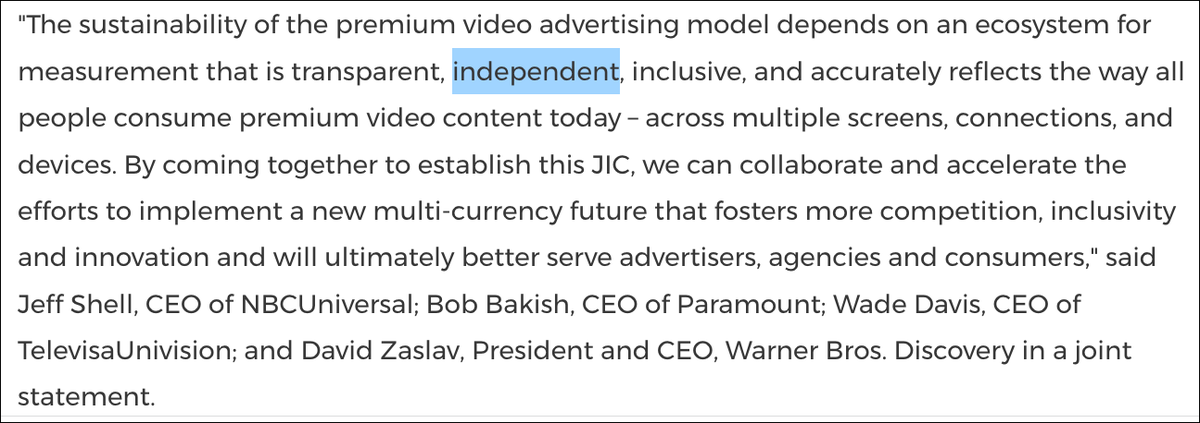Commentary
Disjointed Industry Committee
- by Joe Mandese @mp_joemandese, January 9, 2023

A story circulating in the trade press (including MediaPost) this morning reports that OpenAP – an entity owned by the largest U.S. TV networks – Fox, NBCUniversal, Paramount, Televisa/Univision, Paramount, Warner Bros. Discovery and network TV ad sales association the Video Advertising Bureau have formed a joint industry committee (JIC) to certify new advertising sales currencies being developed by audience measurement suppliers.
The problem is, it’s not a JIC. At least not the way it has historically been defined and how it functions in other markets around the world. By definition, a JIC is a “joint” industry committee, which in the ad industry means it is tripartite, or jointly owned by advertisers, agencies and their media suppliers.
The reason for that, is to ensure that all sides of the industry have an equal say in the design, development -- and importantly, sourcing the suppliers of audience measurement that is the basis for buying and selling advertising.
advertisement
advertisement
And by their own admission in this morning’s announcement, the OpenAP initiative was not conceived that way, noting, “In the coming months, the JIC intends to expand membership to other qualified premium video programmers. The JIC will also elicit active participation from advertising agencies and qualified trade bodies to advance the multi-currency future in this collaborative forum.”
It’s yet another example of the media supply chain – not the demand-side – taking the lead on something that should fundamentally be media-neutral. Otherwise, it’s just a bunch of media suppliers not just grading their own homework, but setting the rules they are graded by.
I wrote at length about the efforts of big media suppliers to do this over the past year, especially NBCUniversal, which became the first TV network owner to “certify” its own currency. Despite that – or maybe because of it – MediaPost also named NBCUniversal as its supplier-of-the-year, because it was so influential in making that change and, importantly, in getting advertisers and agencies to accept it.
If you read between the lines of that profile and much of my coverage over the past year, you’ll probably infer that I don’t think it’s a good thing for advertisers to capitulate and let their supply chain set the standards and measures for what they pay for.
It represents a fundamental sea change for the ad industry, but in another way, recognizes that the rules of the digital advertising supply chain have supplanted the ones that the TV (and other traditional media) were founded on.
That said, I don’t think you’re likely to hear much if any pushback from advertisers or agencies, and the OpenAP initiative will likely succeed, ad agencies and “qualified trade bodies” will join and everyone will call it a JIC. Except it won’t be a JIC in the true spirit of the concept, because it won’t have been organized by advertisers, agencies and their supply chain.





Putting aside that this isn't a JIC as constituted elsewhere in the world, what happened to the excuse bandied about for decades that a creating a JIC in the USA was never done because it was potentially a non-competitive action subject to anti-trust laws? Did that change or does nobody believe anymore that a certain large media research company would threaten a JIC with antitrust?
@David Tice: Good point. And great memory. I think it was mainly bandied about by Nielsen, because I'm pretty sure that back when it first came up with Gale Metzger's SMART TV intiiative, NBC/GE's lawyers looked into it, and they determined there was no grounds to that. But it was enough to spook the industry (or at least the ARF) from moving forward with anything.
JIC's are not antitrust, because they're not fixing price. They're just creating jointly-agreed upon standards and suppliers that are used for the basis of negotiating price.
Exactly! It's a "MOC", Media Owner Committee, not a JIC. In addition, for obvious reasons, JIC's are controlled by the buy side not the sell side despite any funding disparities, and manage and deliver a single currency. This currency - there can be only one otherwise its not a currency! - is typcally based on measures of persons exposure to content (Eyes-On or Ears-On) via panel as a key component, for the entire population, not solely on device measures, for all major media vehicles in each major media platform fro each JIC. JIC's often contract innovative consortiums to execute the currency to achieve optimum quality and to solve critical industry issue and technical concerns.
Based on the ARF Special Meeting, January 31 2005, it was made clear that JICs were not antitrust.
@Tony Jarvis: Thank you for clarifying.
Media agencies are cut to the bare bone with almost no knowlegeable reseach people to refute this stuff.
Joe is right, the networks will get away with it, as the agencies have become so large they can't say no to anyone.
Ironic? Yep.